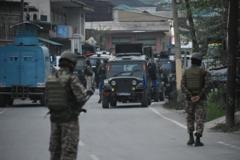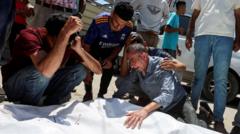After a devastating attack in Indian-administered Kashmir, India launches "Operation Sindoor," leading to heightened diplomatic friction between the nuclear-armed neighbors.
**India Strikes Pakistan Following Deadly Militant Attack, Tensions Escalate**

**India Strikes Pakistan Following Deadly Militant Attack, Tensions Escalate**
In a retaliatory move, India conducts air strikes targeting terrorist infrastructure in Pakistan and Pakistan-administered Kashmir amidst rising regional tensions.
India has taken significant military action against Pakistan in response to a recent and deadly militant assault on tourists in Indian-administered Kashmir. Following the April 22 attack, which led to the loss of 26 lives, including one Nepali national, the Indian government announced a series of strikes on multiple locations within Pakistan and Pakistan-administered Kashmir. The Indian Defence Ministry emphasized that "Operation Sindoor" was aimed at holding those responsible accountable.
In stark contrast, Pakistan Prime Minister Shehbaz Sharif condemned the strikes as "unprovoked aggression," stressing that such actions would face consequences. Pakistani military officials claim that they have downed five Indian aircraft and a drone amid the ongoing conflict, though India has not yet commented on these allegations. Pakistani reports also indicate that civilian casualties have risen to eight as a result of the strikes.
Early on Wednesday, India reported that it targeted nine locations believed to be linked to militant activities, claiming that the operations were limited and focused on specific "terrorist infrastructure." Pakistan contended that these strikes primarily impacted civilian areas, effectively rejecting India’s assertions of targeting militant camps.
The catalyst for India's military action was the earlier attack in Pahalgam, which was notably distressing for the nation, leading to public outcry and calls for stringent punitive measures against the suspected attackers. Prime Minister Narendra Modi pledged that the perpetrators would be pursued relentlessly. However, India has yet to identify the specific militant group responsible, although Pakistani nationals have been implicated by Indian police.
The tension between India and Pakistan has been exacerbated by mutual diplomatic gestures, including the expulsion of diplomats and a shuttering of border crossings. These latest developments raise alarm reminiscent of previous escalations, notably the 2019 Pulwama attack. The ongoing conflict serves as a grim reminder of the contentious history surrounding the Kashmir region, which has been a flashpoint for both nations since Partition in 1947.
With grim recollections of past confrontations, global leaders are calling for restraint, with UN Secretary-General António Guterres and former US President Donald Trump urging de-escalation. As the situation unfolds, it remains critical for international stakeholders to monitor the progression to avert further conflict.
In stark contrast, Pakistan Prime Minister Shehbaz Sharif condemned the strikes as "unprovoked aggression," stressing that such actions would face consequences. Pakistani military officials claim that they have downed five Indian aircraft and a drone amid the ongoing conflict, though India has not yet commented on these allegations. Pakistani reports also indicate that civilian casualties have risen to eight as a result of the strikes.
Early on Wednesday, India reported that it targeted nine locations believed to be linked to militant activities, claiming that the operations were limited and focused on specific "terrorist infrastructure." Pakistan contended that these strikes primarily impacted civilian areas, effectively rejecting India’s assertions of targeting militant camps.
The catalyst for India's military action was the earlier attack in Pahalgam, which was notably distressing for the nation, leading to public outcry and calls for stringent punitive measures against the suspected attackers. Prime Minister Narendra Modi pledged that the perpetrators would be pursued relentlessly. However, India has yet to identify the specific militant group responsible, although Pakistani nationals have been implicated by Indian police.
The tension between India and Pakistan has been exacerbated by mutual diplomatic gestures, including the expulsion of diplomats and a shuttering of border crossings. These latest developments raise alarm reminiscent of previous escalations, notably the 2019 Pulwama attack. The ongoing conflict serves as a grim reminder of the contentious history surrounding the Kashmir region, which has been a flashpoint for both nations since Partition in 1947.
With grim recollections of past confrontations, global leaders are calling for restraint, with UN Secretary-General António Guterres and former US President Donald Trump urging de-escalation. As the situation unfolds, it remains critical for international stakeholders to monitor the progression to avert further conflict.





















